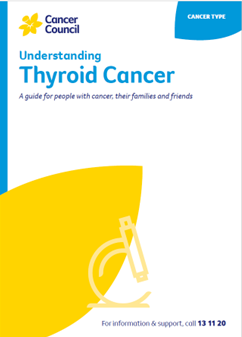- Home
- Thyroid cancer
- Treatment
- Radioactive iodine treatment
- Having RAI treatment
Having RAI treatment
You will be admitted to hospital on the day of the RAI treatment. After swallowing the RAI tablet, your body fluids will be radioactive for a few days and you will need to stay in hospital during this time. See Safety precautions during RAI treatment for an outline of the safety measures that will be in place while you are having treatment. It’s a good idea to ask any questions about this before you go into hospital, so you are prepared.
Once the radiation has dropped to a safe level, you will be able to go home. If you had Thyrogen injections, this is usually within 2–3 days. It may be a day longer if you stopped taking your T4 medicine.
A few days after treatment, you will have a full body radioisotope scan to check for any thyroid cells. It’s normal to see an area of RAI uptake in the neck as small amounts of healthy thyroid tissue remain after surgery. RAI takes several months to destroy this tissue.
The scan may also show if cancer has spread to your lymph nodes or other areas of your body.
→ READ MORE: Safety precautions during RAI treatment
Podcast: Coping with a Cancer Diagnosis
Listen to more of our podcast for people affected by cancer
More resources
A/Prof Diana Learoyd, Endocrinologist, GenesisCare North Shore, Faculty of Medicine and Health, University of Sydney, NSW; Emeritus Professor Leigh Delbridge AM, The University of Sydney, Thyroid Surgeon, The Mater and North Shore Private Hospitals, NSW; Prof Ruta Gupta, Tissue Pathology and Diagnostic Oncology, Royal Prince Alfred Hospital and The University of Sydney, NSW; Susan Leonard, Cancer Nurse Coordinator Thyroid and Brachytherapy, Cancer Care Services, Royal Brisbane and Women’s Hospital, QLD; Dr Dean Lisewski, Endocrine and General Surgeon, Fiona Stanley Hospital and St John of God Hospital, Murdoch, WA; Caitriona Nienaber, 13 11 20 Consultant, Cancer Council WA; Jonathan Park, Consumer; A/Prof David Pattison, Deputy Director and Senior Staff Specialist, Department of Nuclear Medicine and Specialised PET Services, Royal Brisbane and Women’s Hospital and School of Medicine, University of Queensland, QLD; Prof Bruce Robinson, Endocrinologist, Co-Head, Cancer Genetics, Kolling Institute of Medical Research, The University of Sydney and Royal North Shore Hospital, NSW; Marissa Ryan, Team Leader (Cancer) Pharmacist, Princess Alexandra Hospital, Brisbane, QLD.
View the Cancer Council NSW editorial policy.
View all publications or call 13 11 20 for free printed copies.
Need to talk?
Support services
Coping with cancer?
Ask a health professional or someone who’s been there, or find a support group or forum
Looking for transport, accommodation or home help?
Practical advice and support during and after treatment
Cancer information
Making cancer treatment decisions
Decision-making steps, consent and second opinions
Where to find clinical trials
Links to information about current clinical trials of new therapies

